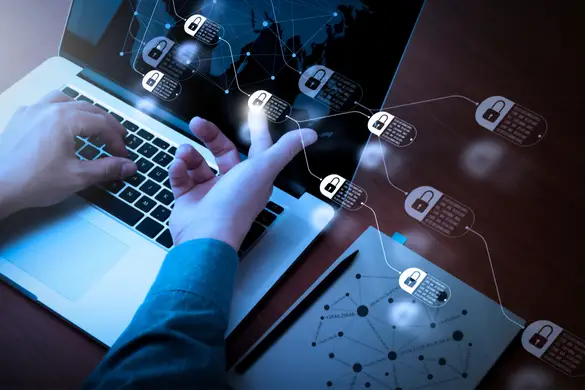
Whether from a business or individual perspective, it’s likely you heard of blockchain, but you might not fully understand what it is. Of course, this is one of the most disruptive global trends in the fintech market.
In simple terms, blockchain is the technology behind cryptocurrency, including bitcoin and thousands of others. It becomes more complex than that, however.
Below, we’ll cover a bit of what you should know.
The Basics Of Blockchain
Blockchain is a distributed database shared among nodes of a computer network. It’s a database that stores digitally formatted information electronically. The main reason we hear about blockchains is that they play a necessary role in cryptocurrency.
For cryptocurrency, blockchains help maintain a secure and decentralized transaction record.
Blockchain, in the concept of crypto guarantees that a record of data is secure. It is one of the best ways to secure your business. This secured data record helps create trust, but without the need for a third party.
While it is a type of database, there are differences.
A database, for example, usually has data in tables. Blockchain structures data into blocks, which are chunks. These chunks are strung together. The data structure then creates a timeline of data that can’t be reversed. If a block is filled, it’s then part of the timeline that can’t be changed. Every block in a chain has an exact timestamp when it’s added.
The blocks are linked together by what’s called cryptography. When new data comes into the chain, it’s added to a fresh block. After that data is filled, it’s chained to the previous, so the data, as mentioned, becomes strung together chronologically.
Blockchain can also be described as a public record of transactions. The way blockchain is managed makes it nearly impossible to change or hack. The technology facilitates a secure way for individuals to deal with each other without needing an intermediary, like today’s banking options.
Steps In The Process
We briefly discussed this, but the following are the more specific steps in the blockchain system specific to bitcoin.
- First, if the purchase or sale of bitcoin happens, it’s entered. Then, after the transaction is entered, it’s transmitted to a network of computers. The computers that are part of this network are known as nodes.
- There is a network of thousands of nodes around the world. The nodes compete to confirm the transaction using algorithms, which is bitcoin mining.
- The bitcoin miner who is the first to complete a new block then receives a reward for their work in the form of a bitcoin.
- The rewards are paid with newly minted bitcoin and network fees. The buyer and the seller pay the fees, and they go up and down based on the volume of transactions. Of course, there are many ways bitcoin is impacting business sales speeds.
- Once the purchase is confirmed cryptographically, the sale is added on the distributed ledger to a block.
Other Applications Of Blockchain
Outside of cryptocurrency, there are other applications of blockchain.
For example, blockchain is currently being used to offer private network solutions to manage product supply chains more accurately. Companies, as one example, can use blockchain technology to find out where recalled food items have been shipped and sold, doing so quickly.
Deloitte Consulting is currently suggesting implementing a nationwide blockchain network for patient health records to help make the management of these records more efficient. The hope is that by doing so, it could improve patient outcomes.
Blockchain technology is being used to facilitate smart contracts. Contract terms can be changed or updated automatically using a set of conditions.
Some developers are working on ways to use blockchain for elections.
There are also a lot of implications for blockchain in real estate and other types of asset sales. It’s now even possible to sell a home fast with blockchain technology.
What Are The Pros And Cons?
One of the biggest pros of blockchain technology is that it allows people to bypass corrupt financial institutions in other countries.
Blockchain technology, no matter the country, puts more power in the hands of the individual for certain transactions because they don’t have to work with a bank, for example.
There are downsides, however. For example, as it relates to blockchain cryptocurrencies, they’re still niche and very volatile.
There’s also an environmental impact of blockchain technology that has some worried. The process of bitcoin mining uses high-speed computers that consume a lot of energy, so developers are working to create less impactful options.
 Business First Family Business, Accounting, Finance, Investing, Marketing And Management
Business First Family Business, Accounting, Finance, Investing, Marketing And Management